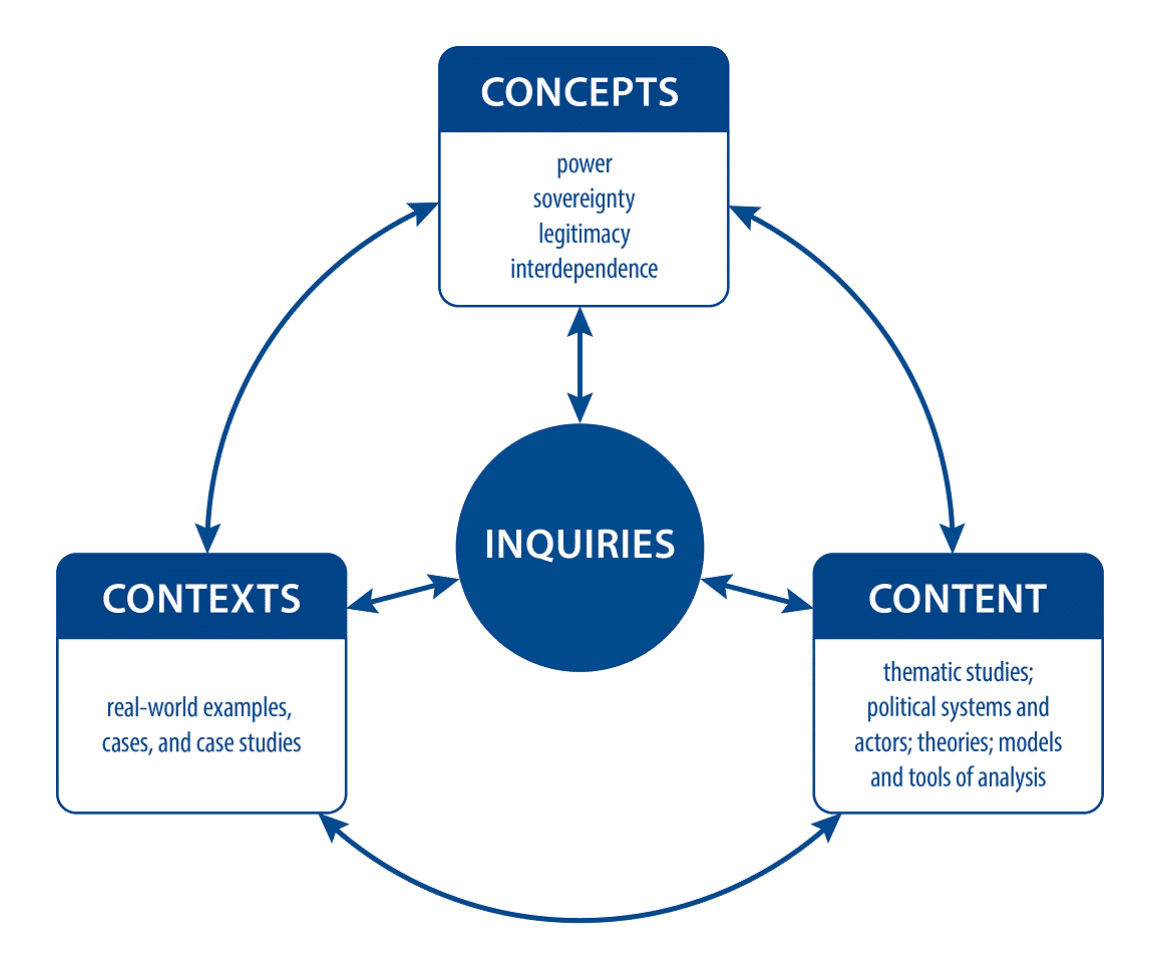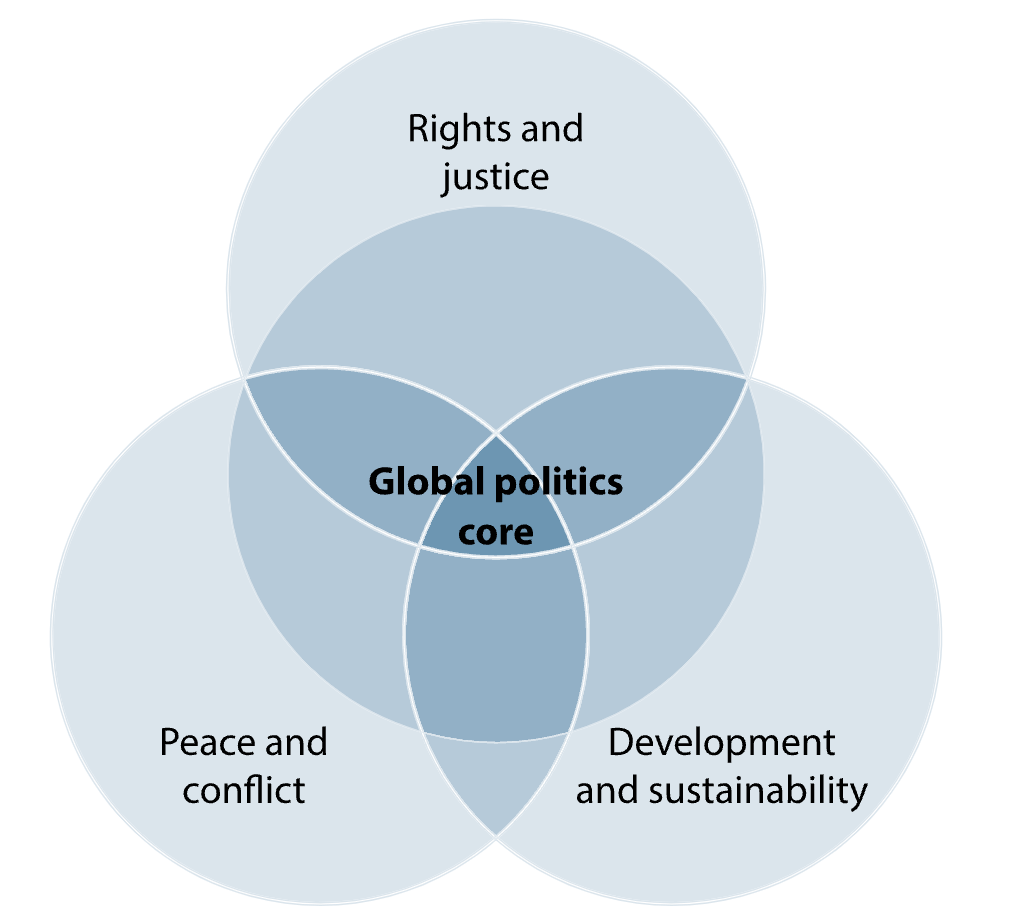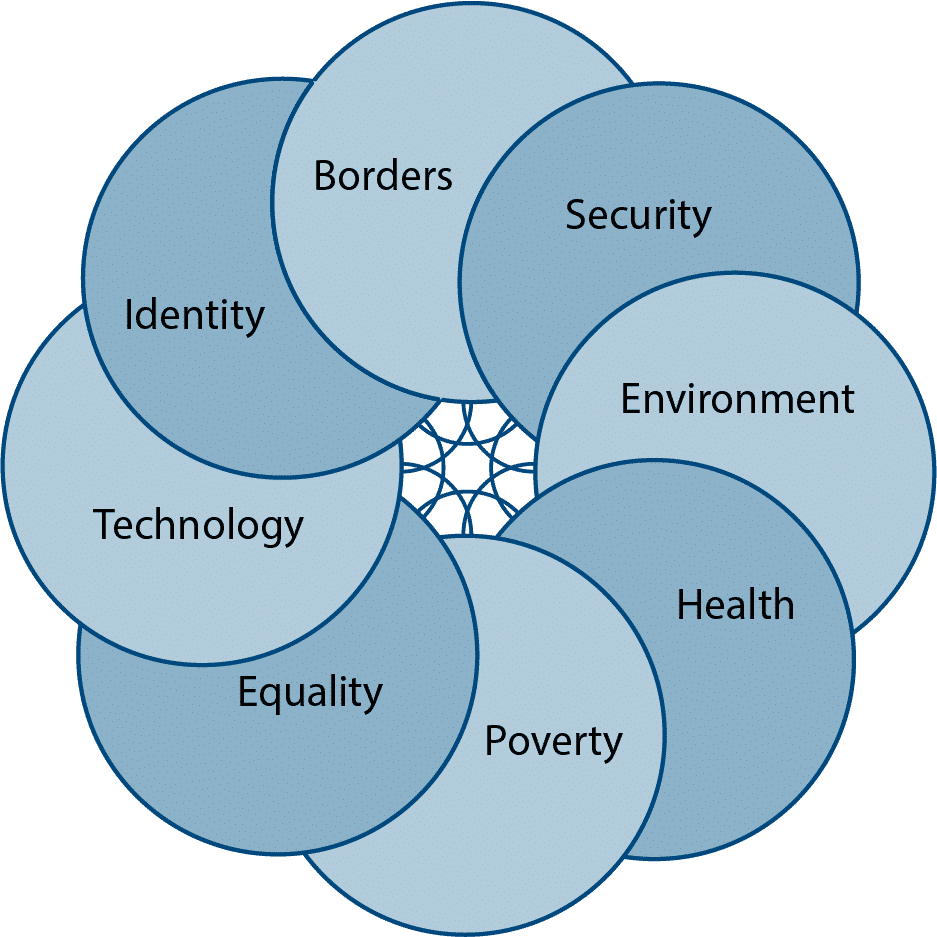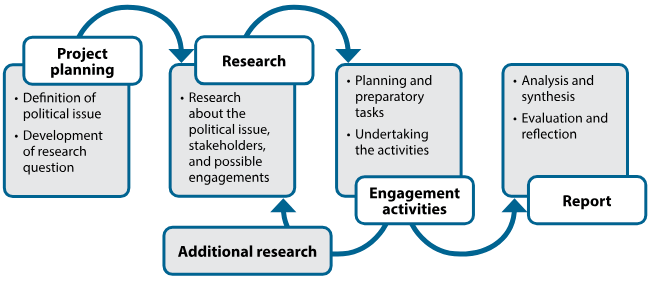
Structural Changes
Before looking at specific changes in the syllabus content, let us take a step back to look at some of the changes to the fundamental aspects of the course. When looking at the “Nature of the Subject” portion of the guide, we can see the fundamental shift in course construction for the new 2026 syllabus. The IB has devised a model for inquiry to encompass all the different aspects of the course:
IB Global Politics Guide (First Exams 2026), p.7
Changes in Prescribed Content
ManageBac has produced a useful spreadsheet to track all content changes between the old and the new syllabus.DOWNLOAD DP GLOBAL POLITICS SYLLABUS MAP
From the outset, we can see that the IB wants to foster a more integrated approach between the core topics and the three thematic studies. This is reflected in the figure below as well as in the structure of the newly-designed Paper 2 (see later in this article).
IB Global Politics Guide (First Assessment 2026), p.33

IB Global Politics Guide (First Assessment 2026), p.52
Changes to Assessment
Paper 1 Paper 1 remains largely unchanged. It is still a stimulus-based paper composed of 4 sources that can be a mixture of textual and non-textual inputs. The paper still comprises 4 questions and the nature of the questions is the same. The content for this paper is the global politics core topics. There has been some redistribution to the number of marks awarded for each question. Question 3 (dealing with the comparing and contrasting of sources) has been modified down to 6 marks. Additionally, the final question (requiring an extended response based on all sources) has increased to 12 marks. Paper 2 Paper 2 has undergone more significant changes than Paper 1. Both the structure and the number of marks for the paper have changed. In the 2017 guide, 2 questions tested each of the 4 prescribed topics, each worth 25 marks. Higher Level students had two hours and forty-five minutes to answer 3 questions, each from a different topic. Standard Level students had one hour and forty-five minutes to answer two questions, each from a different topic. With the 2026 guide, there is no differentiation between Higher Level and Standard Level students. They will all need to answer one question from Section A, where each question centres on one of the thematic studies, and another from Section B, where questions integrate the various themes and core topics. This focus on integration mimics the syllabus designers' aims for more course integration, as seen earlier. The mark scheme has changed also. Those familiar with the DP History course might note similarities in the wording of the markbands for Paper 2. Paper 3 Perhaps the biggest change in the new guide is the addition of a Paper 3 for Higher Level in lieu of two Higher Level presentations previously. This change aligns Global Politics more closely with other Group 3 subjects in the DP. Paper 3 is based on the 8 Global Political Challenges from the Higher Level portion of the syllabus. The paper consists of 3 stimulus-based questions. In this case, the stimulus is used to promote analysis and discussion with most of the relevant examples coming from the case studies that the students have researched. In this paper, students will be asked to understand the stimulus, identify and describe a political issue, make a recommendation for a course of action, and synthesised and evaluate their chosen case studies and global political challenges.Internal Assessment
The Political Engagement Activity has now been classified as a Political Engagement Project and some differentiation between SL and HL has been introduced. Standard Level students are meant to spend a total of 25 hours on the Internal Assessment, whereas Higher Level students should spend 35 hours on the IA. By changing the name to Project, the IB has also outlined the importance of process and workflow in the Engagement.
IB Global Politics Guide (First Assessment 2026), p.45
- Students no longer need to provide reasons why they are interested in the political issue. Instead, they must provide evidence of their positions and biases in relation to the issue.
- There is no longer a requirement for students to cite specific lessons learned from the engagements. Instead, the engagement activities need to be critically evaluated.
- The process of the engagement project is now assessed: this includes evidence of a well-planned and integrated research and engagement process.
- Students are now assessed on communication skills such as whether or not the report is well organised and coherently supports understanding.
Further Support
The IB has published a Global Politics eLearning resource that documents the changes (https://pds.ibo.org/global-politics-EN/#/). Starting in February 2024, Category 3 Subject-specific seminars (SSS) will be made available to help teachers transition to the new syllabus. Category 1 and 2 workshops will be made available later in the year. ManageBac will be hosting a webinar on Exploring the New Global Politics Guide to further guide and support subject teachers as well.
Exploring the New Global Politics Guide
Register NowAbout The Author

Kevin Nielsen
IB Diploma Coordinator and teacher
Kevin Nielsen is currently the IB Diploma Coordinator and a teacher of Global Politics at the Canadian International School, Bangalore. He has been teaching IB programmes since 2004 and also teaches History and TOK. He is an Erickson and Lanning Concept-based Curriculum and Instruction trainer and is passionate about conceptual understandings and the transfer of learning. For the 2024/25 school year, he will be moving to Manila with his wife and two sons to take on the role of IB Diploma Coordinator at The British School, Manila.
The Learning Management Digest
Subscribe today to receive our latest resources, events, updates and so much more – specially curated for you, and delivered straight to your inbox.
